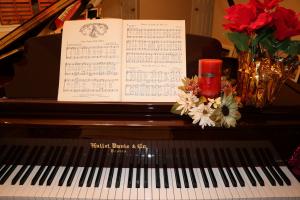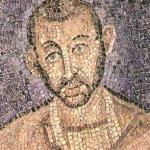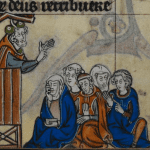Joy to the World

It may surprise you to know that the famous Christmas carol, “Joy to the World,” was not intended as a Christmas song. It was written by Isaac Watts, who, in addition to becoming one of England’s best-known preachers, was also an educator and author. He wrote books on astronomy and philosophy that were used in universities but is best remembered for his hymns.
The words- Isaac Watts
Isaac Watts was born in 1674, in Southampton, England, while his father was in prison for going against the teachings of the Church of England and those of the scholars of his time. Isaac Watts was highly intelligent and learned French, Greek, Latin and Hebrew by the age of thirteen. He might have been sent to Cambridge or Oxford for his education if he had been a member of the Church of England, but instead, he was sent to the Independent Academy (otherwise known as the Dissenters’ Academy) at Stoke Newington.
Isaac attended Above Bar Congregational Church and found church music to be rather boring. He didn’t sense any joy in the songs that were sung in that setting and complained to his father, who challenged him to come up with better alternatives. Isaac took up this challenge and his first song was met with enthusiasm by his father’s church. In fact, they asked for a new hymn each week, and Isaac wrote several hymns over the next two years, after which he moved to London.
There he joined the Mark Lane Independent Church, and became the Senior Pastor in 1702, a position which he would hold for the rest of his life.
An unintended Christmas song
The words of the song “Joy to the World” were inspired by Psalm 98. Watts set out to paraphrase most of the 150 psalms and compiled “The Psalms of David Imitated in the Language of the New Testament and Applied to the Christian State and Worship,” a project that was published in 1719 and garnered mixed reactions. Despite the popularity of the hymns, some people opposed their use in church services. Some even went as far as referring to Watts as an agent of the devil. At the time, people were used to singing metrical psalms, and they believed that singing anything other than words from the Bible would be offensive to God.
In America, Benjamin Franklin published Watt’s hymns in 1729, and the controversies continued. Forty years after Watts’ death, someone reportedly petitioned the General Assembly of the Presbyterian church in Philadelphia to refuse the use of Watts’ hymns in public worship.
A prolific hymn writer
Over the course of his lifetime, Isaac Watts composed over six hundred hymns and poems. The famous hymn “When I Survey the Wondrous Cross” was published in Hymns and Spiritual Songs, in 1707, as part of Watts’ second collection of hymns, the first having been published the previous year. Another well-known hymn that was composed by Isaac Watts is “We’re Marching to Zion.” In 1715, Watts published “Divine Songs for the Use of Children,” a collection of songs for children. Watts died on November 25, 1748, in Stoke Newington, London.
The music – Lowell Mason
Lowell Mason was born in 1792, forty-four years after Isaac Newton’s death. Although he was musically gifted, he didn’t think he could make a living as a musician and pursued a career in banking. He wrote musical melodies and studied the music of the German composer, Handel. His first attempt to get his musical arrangements published was met with rejection. The publisher felt that Americans would not be interested in classical music but would rather prefer new folk music. After this initial disappointment, Mason continued playing the organ in a local church. Eventually, the Handel and Hayden Society of Massachusetts offered to publish his work in 1822, even though Mason requested that his name be omitted from the title page. He was still working as a banker and didn’t want to be known as a musician. It was only after thousands of copies of his work had been sold and used by schools and church choirs that he decided to devote his efforts to music.
In 1836, Mason published Isaac Watts’ Psalm 98-inspired poem together with a tune he attributed to George Handel in a booklet titled “Occasional Psalm and Hymn Tunes.” The tune is believed to have been inspired by Handel’s Messiah and was originally titled “Antioch.”
The work of two “fathers” combined
Isaac Watts was known as the “Father of English Hymnody” and Lowell Mason was known as the “father of American church music.” How appropriate that, together they would produce this most beloved Christmas carol, announcing the birth of Christ!
How “Joy to the World” became associated with Christmas remains a mystery. It was inspired by a passage from the Old Testament, and except for the phrase “The Lord is Come,” doesn’t address the birth of Christ. Regardless, it is not only a Christmas favorite, but also worthy of being sung all year round.
Sources:
Mosteller, Angie. Christmas Songs- Stories behind the classic songs of Christmas, 2010.
Bradley, Ian (Ed.) The Penguin Book of Carols, Penguin Books, 1999.
Collins, Ace. Stories Behind the Best – loved Songs of Christmas, Zondervan, 2001.
Stay tuned for my upcoming book on the stories behind our favorite Christmas songs! In the meantime, check out my Amazon author page!


















